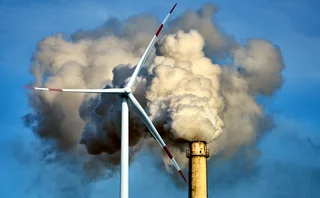Podcast: the difficulties of decarbonisation
What are energy firms doing to measure and mitigate transition risk?

Tackling the risks posed by energy transition, as well as setting and achieving climate goals, has become a high priority at most energy firms and energy-intensive industrials recently. However, with a myriad of variables to be considered, the environment is extremely challenging.
Additionally, because the discipline of financial climate risk management is still relatively nascent, there is a lack of standardisation when it comes to the tools, methodologies and metrics being used. The challenge is made even more complex by the fact that there are a plethora of ways in which firms could pursue their climate goals – improving energy efficiency, using cleaner energy, investing in offsets for example – as well as an array of policy, regulation and market mechanisms to consider.
In this podcast, Erika Bierschbach and Scobie Mackay talk about the actions firms are taking in response to the energy transition.
As vice-president of energy market operations and resource planning at Austin Energy, Bierschbach provides an interesting insight into her firm’s transition journey. Mackay, who is a managing director in the commodities and global markets group at Macquarie, talks about some of the ways in which firms can green themselves and overcome some of the challenges they will meet on their decarbonisation journeys.
Index
1:25 What are Austin Energy’s transition plans?
4:10 Does becoming carbon free mean you will have no generation from fossil fuels at all?
6:07 By what other means are firms reaching their climate goals? What are the major trends you’re seeing?
9:30 Will offsets continue to be a bridge for some time to come in firms’ greening efforts?
11:10 What have been the biggest challenges with deciding and embarking on your decarbonisation plans?
15:02 Are you counting on some technologies not yet developed or available to you?
16:24 At what stage do firms tend to come to you looking for decarbonisation solutions? Have they set their goals and know how they want to achieve them or is that part of the work you do with them?
17:00 What’s the thought process at Austin Energy in terms of which carbon metrics to use for tracking and measuring climate progress?
24:00 What impact has Covid-19 had on firms’ decarbonisation journeys?
27:36 Have low oil prices caused firms to dial down the urgency of their climate goals?
29:45 Do you think the energy industry is doing enough when it comes to mitigating the effects of climate change?
To listen to other podcasts in this series, click here.
More on Energy transition
CRO interview: Brett Humphreys
Brett Humphreys is head of risk management at environmental markets specialist Karbone. He talks to Energy Risk about the challenges of modelling outcomes in unpredictable times and how he’s approaching the risks at the top of his risk register
High risk and volatility require new risk management approaches
Energy leaders warn fast-rising geopolitical, market and infrastructure risks demand new strategies, AI adoption and stronger risk culture
Uncertainty causes rethink on clean energy investment
Waning enthusiasm for net-zero pledges, environmental policy shifts, funding cuts and US tariffs are causing clean energy investors to retreat
Data and analytics firm of the year: LSEG Data & Analytics
Energy Risk Awards 2025: Firm’s vast datasets and unique analytics deliver actionable insights into energy transition trends
Sustainable fuels house of the year: Anew Climate
Energy Risk awards 2025: Environmental firm guides clients through regulatory flux
Corporates keep the faith on net-zero goal
Large corporates’ energy transition includes trading and risk management in energy and commodities markets
Environmental products house of the year: ENGIE
Renewable energy and the liberalisation of power markets in Apac present significant long-term growth opportunities, with ENGIE driving change in energy transition
ENGIE empowers clients globally to decarbonise and address the energy transition
In recent months, energy market participants have faced extreme volatility, soaring energy prices and supply disruptions following Russia’s 2022 invasion of Ukraine. At the same time, they have needed to identify and mitigate the longer-term risks of the…








